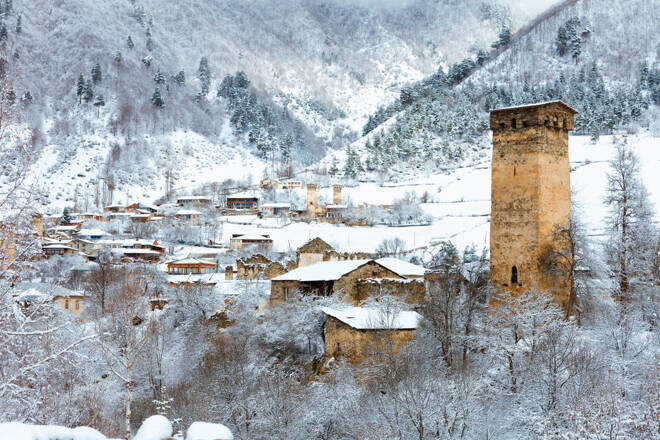Advertisement
Advertisement
Georgian Town Takes a Sacred Vow to Refrain from Crypto Mining as Power Outages Strike
By:
Residents in a mountainous Georgian province have turned to an ancient religious rite in a bid to stop the country from falling into midwinter darkness.
Winter is beginning to bite for bitcoin and altcoin miners around the world: This week, Iranian miners have been told to shut off their rigs to preserve ailing energy grids, while industrial miners in Kazakhstan have been disconnected from networks. And now residents of a small Georgian town have turned to an ancient religious rite in a bid to stop the area from plunging into midwinter darkness.
In September, reports circulated, deals were struck that resulted in some 560,000 BTC mining rigs moving into the small Central European nation. Georgia began punching above its weight in the crypto mining world in the mid-2010s. University of Cambridge data from August 2021 shows that the country is responsible for just under 0.2% of the global bitcoin hashrate. But the same body also found that in 2018, only one other country in the world dedicated more of its national power consumption to mining tokens.
Industrial miners relocating from Mainland China appear to have put a strain on the network – and a rise in domestic mining is now being blamed for power outages in parts of the nation.
Residents’ Ire
One such region is the mountainous province of Svaneti. The Russian-language media outlet Vzglad reported that angry residents of the townlet of Mestia have staged protests “throughout the week” – demanding that mining centers in the province shut off their rigs.
They have also accused the local government of inaction and promoting crypto mining. The residents complain that not only have their lives been disrupted by power outages but also that the issue has hit the tourism sector – the main source of income for many Mestia residents.
Some, however, say that it is not industrial players who are to blame and that domestic miners running small numbers of rigs at home are causing the local grid to falter. Late last week, the Georgian-language media outlet Rustavi2 reported that the police uncovered a group of illegal crypto miners in a downtown hotel using “enough electricity to power 12-14 small villages” to keep their rigs running.
With fingers of blame now being pointed in all directions, the residents gathered at a famous church in the region – home to a sacred idol of St. George. The residents swore solemn oaths not to engage in mining over the ancient idol.
Holy Promises
In Orthodox Christianity, the dominant religion of Georgia and much of the former Soviet Union, idols play a central role in spirituality. But according to local tradition, anyone breaking an oath sworn over this particular idol will bring great dishonor to their soul – and to those of their relatives and ancestors.
Residents were quoted as “saying that there was no other way around the issue and that they “had been forced to take the oath as the last resort.”
Mobile phone video footage of the gathering was shared on social media by the media outlet Sputnik Georgia.
About the Author
Tim Alperauthor
Tim Alper is an IT writer with over a decade and a half of top-level journalism experience. He has written about tech, including crypto and blockchain, as well as other subjects for leading media outlets including the BBC, the Guardian, the Times of Israel, Chosun Ilbo, Maeil Kyungjae, Kyunghyang Shinmun, the Korea Times and the Jewish Chronicle. He has also worked with major bands in the IT space, including Microsoft, Samsung and Accenture.
Advertisement
